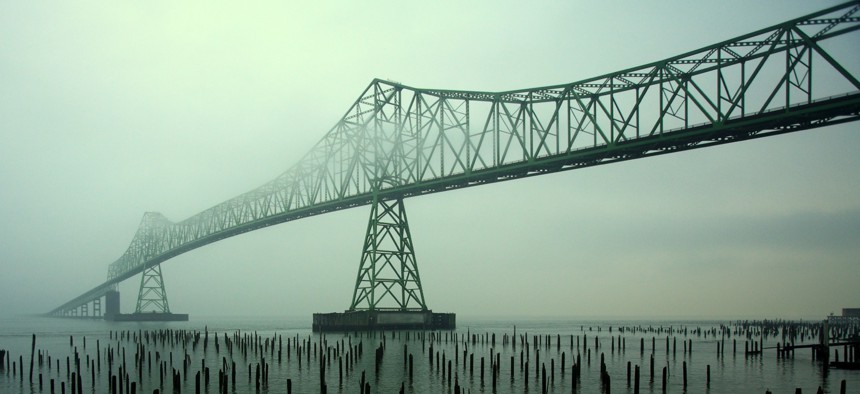Connecting state and local government leaders
On the lookout for ‘scour’ and ‘shipworms,’ a dive team works to make sure the Beaver State’s overpasses stay standing.
On Monday morning, Rick Shorb was headed with a crew of scuba divers to Tillamook County, which is located west of Portland, on the Oregon coast.
They were going there to inspect bridges.
Currently the senior dive inspector for the Oregon Department of Transportation, Shorb has been descending into rivers and coastal waters for over two decades searching for damage and other problems that could weaken hulking supports—called piers—that prop up the state’s overpasses. “We just inspect the parts of the bridge that the above-water guys can’t get to,” Shorb said during a phone interview on Monday. “We cover the whole state.”
Federal requirements mandate that these types of underwater inspections be carried out regularly for bridges in the U.S. Some states hire contractors to do the work. Others, like Oregon, have in-house teams. However the inspections get done, they are important.
"Most bridge failures occur because of underwater issues," warned a reference manual on underwater bridge inspections prepared for the Federal Highway Administration in 2010. At that time, the manual said at least 502,000 bridges in the U.S. crossed waterways.
In Oregon, there are about 1,100 overpasses that require underwater inspections, according to Shorb. He estimated that in an average year he and his crew check out about 350.
“The big thing we’re usually looking for is scour,” he explained.
Scour is when moving water washes away sediment, like sand and rocks, from the footing of a bridge pier, undermining it, weakening it and, ultimately, leaving it susceptible to failure.
Storm activity, flooding, or year-to-year changes in river flows can affect how this process occurs.
In 1987, two spans of a New York State Thruway bridge span passing over Schoharie Creek catastrophically collapsed, sending four cars and a tractor trailer plummeting about 80 feet into the water below. Ten people died. The creek was bloated from heavy rains and snowmelt at the time, and a National Transportation Safety Board investigation later determined that severe erosion around the bridge’s footings was the probable cause of the incident.
“Since I’ve been doing this, we’ve never had a bridge collapse from an underwater scour failure,” Shorb is quick to point out. “A lot of states can’t say that.”
But there have been times over the years when he and other inspectors have found badly eroded footings.
“We’ve found bridges that we’ve actually stayed there, and called, until someone has got out there and closed the road down,” Shorb said. “That’s not the normal thing, but we have had that happen.”
Modern bridge construction techniques substantially reduce risks tied to scour. But Shorb notes: “We have a lot of older structures in Oregon.” The most recent bridge condition report from the state’s DOT reflects this, pointing out that more than half of the bridges in the state’s current inventory were built prior to 1970 and 57 percent will reach the end of their design lives by 2020.
At the start of his career, Shorb worked for about 10 years designing bridges, and was not an avid diver at that time. Asked how he wound up with his current position he responded: “dumb luck.”
Shorb’s path toward the job can be traced back to his tenure as a coach for a recreational softball team. The dive manager for DOT at the time came out to play for the team and asked him if he was interested in working on underwater inspections. He decided to give it a try. “I just started out as one of the part-time guys,” Shorb said. “I liked it so much, I would rather stay out here than go back into the office.”
There is one other full time member on the dive team. There are six part-time members as well, they also work for Oregon DOT and three of them are above-water bridge inspectors.
“Normally, three or four is how many divers we’ll have go with us at a given time,” Shorb said.
In addition to scour, the underwater inspectors look for damage from vessels or drifting trees hitting the bridge piers. They also have to watch for “shipworms.”
Shipworm is the colloquial term for a type of mollusc that has an appetite for wood. Some of the major bridges in Oregon were constructed decades ago and have foundations built on timber.
Left unchecked the shipworms can weaken the timbers at the base of a bridge, and “basically can turn them into Swiss cheese,” Shorb said.
“They go in as tiny microbes,” he added. “The more wood they eat, they turn into big long worms, basically, and they continually keep growing.”
Piers for some of the state’s bridges can be reached by diving from the shoreline. Others require a boat to access.
Some can extend deep underwater.

For instance, piers supporting the Oregon side of the Astoria-Megler Bridge go as far down as 60 to 65 feet, or roughly six stories, beneath the surface of the Columbia River. U.S. Highway 101 runs across the bridge, which stretches just over four miles between Oregon and Washington state. Shorb pointed out that there are about 180 piers in the water beneath the span.
“We do a portion of it every year so we’re not over there for a solid six weeks,” he said. “It’s a big bridge.” He and a crew had recently completed a round of inspections on the structure.
The divers sometimes have to contend with hazards. There can be swift currents, poor water quality and stray fishing nets. “The physical requirements are fairly demanding,” Shorb said.
Layers of marine and aquatic growth on bridge supports further complicate matters.
“It’s just a whole different world underwater,” Shorb said. “You don’t see nice clean concrete or timber or steel.” He explained that the piers can at times be “completely covered in 3 or 4 inches of just solid sea anemones, starfish, barnacles.”
Despite the difficulties that come with the job Shorb admits that “it’s pretty nice to be on a river almost every day out of the year.”
But that’s not the only reason he and the other inspectors like the work. “We get a lot of job satisfaction,” Shorb said, “making sure we don’t let any of these bridges fall down.”
Bill Lucia is a Reporter for Government Executive’s Route Fifty.

NEXT STORY: How Chicago is Trading in Sewage Treatment for Water Reclamation




